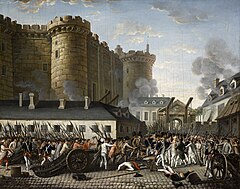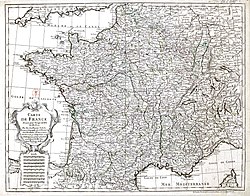
French Revolution
Revolution in France from 1789 to 1799 / From Wikipedia, the free encyclopedia
Dear Wikiwand AI, let's keep it short by simply answering these key questions:
Can you list the top facts and stats about French Revolution?
Summarize this article for a 10 years old
The French Revolution (French: Révolution française [ʁevɔlysjɔ̃ fʁɑ̃sɛːz]) was a period of radical political and societal change in France that began with the Estates General of 1789, and ended with the formation of the French Consulate in November 1799. Many of its ideas are considered fundamental principles of liberal democracy,[1] while the values and institutions it created remain central to French political discourse.[2]
| Part of the Atlantic Revolutions | |
 The Storming of the Bastille, 14 July 1789 | |
| Date | 5 May 1789 – 9 November 1799 (1789-05-05 – 1799-11-09) (10 years, 6 months, and 4 days) |
|---|---|
| Location | Kingdom of France |
| Outcome |
|
Part of a series on the |
||||||||||||||||||||
|---|---|---|---|---|---|---|---|---|---|---|---|---|---|---|---|---|---|---|---|---|
| History of France | ||||||||||||||||||||
 | ||||||||||||||||||||
|
||||||||||||||||||||
|
||||||||||||||||||||
|
Ancien Régime
|
||||||||||||||||||||
|
||||||||||||||||||||
|
||||||||||||||||||||
| Topics | ||||||||||||||||||||
| Timeline | ||||||||||||||||||||
|
| ||||||||||||||||||||
Its causes are generally agreed to be a combination of social, political and economic factors, which the Ancien Régime proved unable to manage. In May 1789, widespread social distress led to the convocation of the Estates General, which was converted into a National Assembly in June. Continuing unrest culminated in the Storming of the Bastille on 14 July, which led to a series of radical measures by the Assembly, including the abolition of feudalism, the imposition of state control over the Catholic Church in France, and extension of the right to vote.
The next three years were dominated by the struggle for political control, exacerbated by economic depression and civil disorder. Austria, Britain, Prussia and other external powers sought to restore the Ancien Régime by force, while many French politicians saw war as the best way to unite the nation and preserve the revolution by exporting it to other countries. These factors resulted in the outbreak of the French Revolutionary Wars in April 1792, abolition of the French monarchy and proclamation of the French First Republic in September 1792, followed by the execution of Louis XVI in January 1793.
Following the Paris-based Insurrection of 31 May – 2 June 1793, the constitution was suspended and effective political power passed from the National Convention to the more radical Committee of Public Safety. An estimated 16,000 "counter-revolutionaries" were executed during the subsequent Reign of Terror, which ended with the so-called Thermidorian Reaction in July 1794. Weakened by a combination of external threats and internal opposition, in November 1795 the Republic was replaced by the Directory. Four years later in November 1799, the Consulate seized power in a military coup led by Napoleon Bonaparte. This is generally seen as marking the end of the Revolutionary period.
